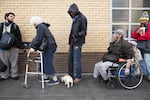On Wednesday afternoon, Ken Johnson, 52, stood in line at Blanchet House, waiting for his takeout container of beef, vegetable rice and marionberry cobbler.
Johnson, who spends most of his nights at a homeless shelter in Portland's Old Town Chinatown, has seen his daily schedule rocked in the last few weeks. The usual public libraries and university buildings he hangs out in during the day have locked their doors. It’s difficult to find a place to stay dry when it rains or charge his phone when it’s dead.
There is one constant: Much of his day is still spent waiting in long lines, where few people are spaced much more than an arm's length apart. He waits on Burnside Street, in front of Portland Rescue Mission for breakfast. He waits on NW Glisan Street, in front of Blanchet House, for lunch. And sometimes, if there’s time and he’s hungry, he’ll go back around for seconds.
For Johnson, social distancing isn’t an option — at least, if he wants to be fed.

People stand in line outside of Blanchet House, a homeless service provider in Old Town Chinatown. The nonprofit has seen demand rise and donations plunge.
Jonathan Levinson / OPB
“It’s really not easy to do that when a good percentage of your time is spent standing in a line to get services,” he said. “People tend to want to bunch up and hurry up and get through.”
The service would appear to fly in the face of Gov. Kate Brown's order mandating food establishments maintain at least 3 feet of distance between people waiting in line. But Johnson doesn't have much of a choice — Blanchet House is one of a shrinking number of places in Portland where he can still get a free meal.
Plunging donations, rising demand
The nonprofit's executive director, Scott Kerman, said demand has reached an all-time high for the small organization as many of the pop-up operations that gave out food in churches, parks and under the Burnside Bridge shutting down. Many were staffed by elderly volunteers, for whom continuing to help would now be too risky.
Blanchet House now needs to serve between 1,500 to 1,600 meals each day — a 40% jump since before the pandemic. Kerman’s prepared for demand to rise to 2,000 meals by next week.
At the same time, food donations to Blanchet House have dropped dramatically as bakeries and restaurants have shuttered. Last week, while everyone from the Oregon Zoo to the Hyatt Regency cleaned out their refrigerators, Blanchet House took in more than 30,000 pounds of food. This week, they’ve only taken in a few thousand pounds. Next week, they’ll have to start buying their own food.
Add the governor’s ask that people space out — and the potential legal and health consequences of not doing so — and Blanchet House has reached a crisis point.
“We're kind of faced with Sophie's choice,” said Kerman. “We need to feed these people. They need to eat. They are community members and they are in desperate need right now — and to do that they have to queue up.”
But they simply don’t have the resources to create a line that follows Brown’s order, Kerman said. Their line right now already stretches up to three city blocks.
“Let's just assume hypothetically we could do this. Our line would be six blocks long. How do we supervise a line that long and keep people separated? What prevents somebody with no clue of what's going on from seeing a gap in line and stepping into it because why wouldn't you?” he said.

Following Gov. Kate Brown's order, Blanchet House has now pivoted to takeout only. People in line can grab drinks from a window on NW Glisan Street before turning around the corner for their meal.
Jonathan Levinson / OPB
Sure, supermarkets and big box stores have managed to pull it off with some masking tape and prominent signage. Portland Rescue Mission is looking to do something similar, marking the sidewalks at 6-foot intervals. But Kerman warned that's not going to do the trick for the population he serves, a significant portion of which struggles with severe mental health and addiction issues.
Debra Fresh, a case manager at Blanchet House, who was helping out with crowd control Wednesday, said people were growing frustrated that the spacing she was asking for made the already long line look longer. Some had forgotten her directions by the time she looped back. Certain people she knew to not even ask.
“If I just approached them and told them what to do, that's not going to turn out well for anybody,” she said.
Keeping people safe
While officials remain worried about the public health implications of crowded lines, the governor’s office clarified that it will not be shutting down organizations like Blanchet House for failing to space them out.
The governor's office issued guidance Friday, saying these service providers should "remain open and use social distancing guidelines provided by the Oregon Health Authority."
“The executive order is about how to keep people safe,” said Shannon Singleton, housing policy adviser for the governor, in an interview. "It is not to criminalize homelessness in any way.”
She added that the state has been in regular conversations with Multnomah County on how meal service providers can more closely follow social distancing guidelines, potentially staggering meal times and attracting more volunteers.
So far, the county's primary focus has been on helping the region's crowded homeless shelters find enough space for sick residents to social distance. To that end, they've transformed the Oregon Convention Center, a community center and, as of Thursday, the boutique Jupiter Hotel into temporary shelters.
At a press conference announcing their newest conversion, Marc Jolin, the head of the city-county Joint Office of Homeless Services, said there are also discussions underway on how to support meal providers as they try to enforce social distancing requirements. They just haven’t landed on a comprehensive answer yet.
“Our outreach teams are messaging generally about the importance of social distancing in public spaces whether its food lines or where people are sleeping at night,” he said. “But that is definitely something that we're aware of … and [are] frankly trying to figure out if there are some things that are more concrete that we could do.”
Kerman's hoping for a solution soon. Ideally, he said, trained mental health and addiction counselors would be mobilized by the city and county to assist.
“There is really nothing that we can do ourselves as a small agency to promote 6 feet of spacing,” he said. “So we could really use some help.”
